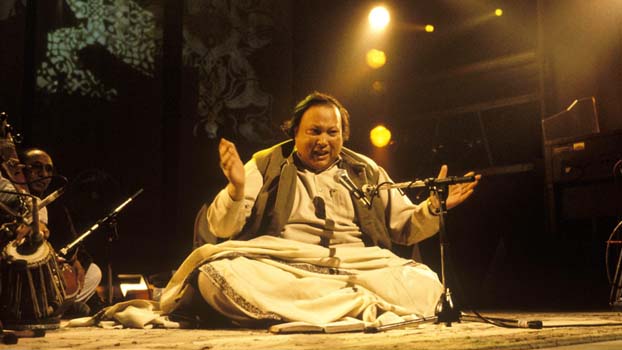Nusrat Fateh Ali Khan: The Wizard of Qawwali

Nusrat Fateh Ali Khan was a Pakistani legend Qawwal and a musician, the reverential music of the Sufis. Amplifying the 600-year old Qawwali convention of his family, Khan is generally attributed with acquainting Qawwali music with worldwide groups of onlookers. He is prevalently branded as “Shahenshah-e-Qawwali”, signifying “The King of Kings of Qawwali”.
He started his career by singing at the age of 13, after the death of his father in 1964, Qawwal extraordinaire Nusrat Fateh Ali Khan has never had to look back. Nusrat Fateh Ali Khan was a foremost singer of Qawwali. This Muslim devotional music, which is prominent in South Asia, has been developed since the fourteenth century by the Sufi circles of the Chishti brotherhood in order to preach and communicate the teachings of the saints.
Inspired by mystic spirituality, Nusrat's music travelled through the East and the West, absorbing some of the features of the musical cultures with which it came in contact. It also travelled through time, transforming the traditional style of the ancient chanted poetry into new forms of musical expression. Nusrat's life and his artistic vicissitudes show the postmodern destiny of Qawwali as a religious kind of music that apparently went through a process of desacralization and profanation as a result of multiple interpretations by different audiences.
In order to discern the conditions of significance, semiotics reconstructs the relation between text and context of interpretation on the ground of structural pertinences. In this way, semiotics offers an analytical standpoint alternative to the postmodernist approach to postmodern cultural phenomena. By surveying the forms of listening that are structurally provided by the textual discourse, semiotics investigates the destiny of the musical and religious meanings of Qawwali in relation to the process of intercultural translation.
He is widely considered to be the most important Qawwal in history. In 1987, he received the President of Pakistan's Award for Pride of Performance for his contribution to Pakistani music. In 1997, he was nominated for two Grammy Awards, for Best Traditional Folk Album and Best World Music Album. As of 2001, he held the Guinness World Record for the "Most Qawwali Recordings", having recorded over 125 Qawwali albums before his death. In 2005, Khan posthumously received the "Legends" award at the UK Asian Music Awards.
Time magazine's issue of 6 November 2006, "60 Years of Asian Heroes", lists him as one of the top 12 artists and thinkers in the last 60 years. He also appeared on NPR's 50 great voices list in 2010. In August 2010 he was included in CNN's list of the twenty most iconic musicians from the past fifty years. In 2008, Khan was listed in 14th position in UGO's list of the best singers of all time. Many honorary titles were bestowed upon Khan during his 25-year music career.
The potent relationship between Qawwali and Nusrat Fateh Ali Khan was amazing. One of his famous Qawwali songs is "Tere Bin Nahin Lagda”. The Kachche Dhaage soundtrack album sold 3 million units in India which was composed by Nusrat Fateh Ali Khan. Nusrat Fateh Ali Khan's music had a big impact on Bollywood music, inspiring numerous Indian musicians working in Bollywood since the late 1980s. For example, he inspired A. R. Rahman and Javed Akhtar, both of whom he collaborated with.
Nusrat Fateh Ali Khan became seriously ill due to his kidney and liver problems. He passed away of a sudden heart failure at Cromwell Hospital, London on 16 August 1997 at the age of 48 years.




